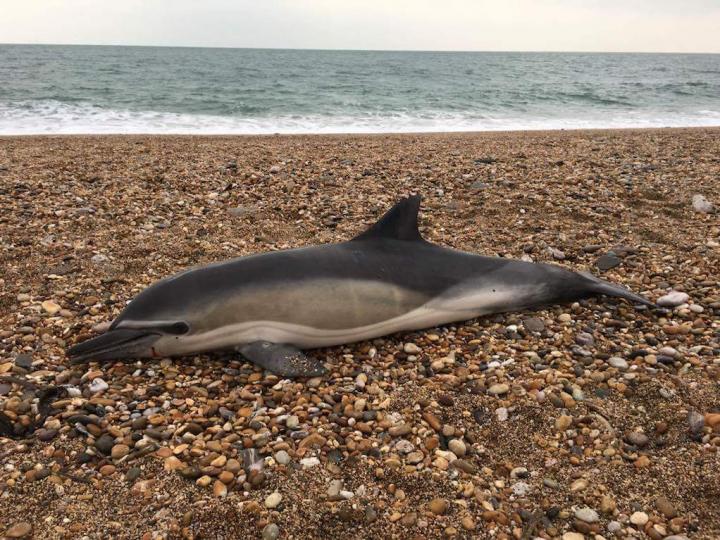
Credit: Frazer Hodgkins & CSIP
Microplastics have been found in the guts of every marine mammal examined in a new study of animals washed up on Britain’s shores.
Researchers from the University of Exeter and Plymouth Marine Laboratory (PML) examined 50 animals from 10 species of dolphins, seals and whales – and found microplastics (less than 5mm) in them all.
Most of the particles (84%) were synthetic fibres – which can come from sources including clothes, fishing nets and toothbrushes – while the rest were fragments, whose possible sources include food packaging and plastic bottles.
“It’s shocking – but not surprising – that every animal had ingested microplastics,” said lead author Sarah Nelms, of the University of Exeter and PML.
“The number of particles in each animal was relatively low (average of 5.5 particles per animal), suggesting they eventually pass through the digestive system, or are regurgitated.
“We don’t yet know what effects the microplastics, or the chemicals on and in them, might have on marine mammals.
“More research is needed to better understand the potential impacts on animal health.”
Though the animals in the study died of a variety of causes, those that died due to infectious diseases had a slightly higher number of particles than those that died of injuries or other causes.
“We can’t draw any firm conclusions on the potential biological significance of this observation,” said Professor Brendan Godley, of the Centre for Ecology and Conservation on the University of Exeter’s Penryn Campus in Cornwall.
“We are at the very early stages of understanding this ubiquitous pollutant.
“We now have a benchmark that future studies can be compared with.
“Marine mammals are ideal sentinels of our impacts on the marine environment, as they are generally long lived and many feed high up in the food chain. Our findings are not good news.”
Dr Penelope Lindeque, Head of the Marine Plastics research group at Plymouth Marine Laboratory, said: “It is disconcerting that we have found microplastic in the gut of every single animal we have investigated in this study.
“Indeed, from our work over the years we have found microplastic in nearly all the species of marine animals we have looked at; from tiny zooplankton at the base of the marine food web to fish larvae, turtles and now dolphins, seals and whales.
“We don’t yet know the effects of these particles on marine mammals. Their small size means they may easily be expelled, but while microplastics are unlikely to be the main threat to these species, we are still concerned by the impact of the bacteria, viruses and contaminants carried on the plastic.
“This study provides more evidence that we all need to help reduce the amount of plastic waste released to our seas and maintain clean, healthy and productive oceans for future generations.”
In total, 26 species of marine mammal are known to inhabit or pass through British waters.
The species in this study were: Atlantic white-sided dolphin, bottlenose dolphin, common dolphin, grey seal, harbour porpoise, harbour seal, pygmy sperm whale, Risso’s dolphin, striped dolphin and white-beaked dolphin.
###
The study, supported by Greenpeace Research Laboratories, used samples provided by the Scottish Marine Animal Stranding Scheme (SMASS), Cornwall Wildlife Trust’s Marine Stranding’s Network and ZSL’s (Zoological Society of London) Cetacean Strandings Investigation Programme (CSIP).
The paper, published in the journal Scientific Reports, is entitled: “Microplastics in marine mammals stranded around the British coast: ubiquitous but transitory?”
Media Contact
Alex Morrison
[email protected]
44-013-927-24828
Related Journal Article
http://dx.




